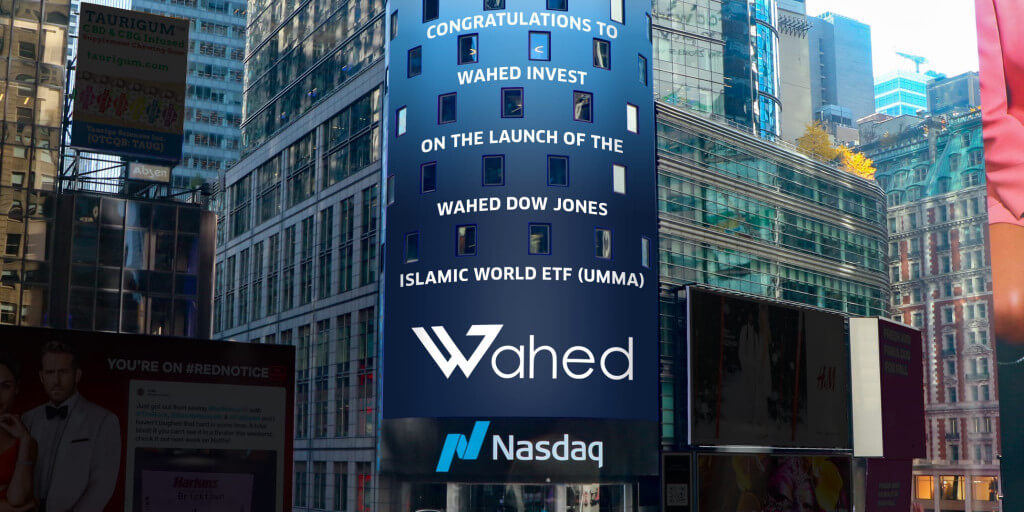US Islamic investment platform Wahed rolls out Sharia-compliant ESG-themed fund
US-based Islamic investment platform Wahed has rolled out a new Sharia-compliant ESG themed exchange traded fund (ETF).
The Wahed Dow Jones Islamic World ETF (Ticker: UMMA) began trading last Friday on the Nasdaq stock exchange.
The actively managed fund will benchmark to the Dow Jones Islamic Market International Titans 100 Index, a data-driven index owned and maintained by S&P Dow Jones Indices. The fund is designed to measure the stock performance of the largest global companies – excluding the US – that adhere to Sharia compliance guidelines.
The new ETF utilises RepRisk, an environmental, social and governance (ESG) data science provider combining machine learning and human intelligence to assess ESG risks. UMMA has an expense ratio of 0.65%
“We’re using RepRisk for daily filtering, screening, and analysis of controversies related to companies within the fund,” said Samim Abedi, chief investment officer at Wahed. “Such analysis includes a range of issues such as economic crime and corruption, fraud, illegal commercial practices, human rights issues, labour disputes, workplace safety, catastrophic accidents and environmental disasters.”
This latest ETF follows Wahed’s first ETF, the Wahed FTSE USA Shariah ETF (Ticker: HLAL), a strictly US equity focused fund which it launched on the Nasdaq in 2019. Wahed says its new ETF would be the first Sharia compliant ESG-focused/theme ETF on Nasdaq.
It joins the growing activity of providers of combining Sharia compliant and ESG principles. Most recently, in November, Saturna Capital, a US-based investment manager partnered with London-based ETF platform HANetf to launch the Saturna Al-Kawthar Global Focused Equity UCITS ETF. The London Stock Exchange, Borsa Italiana and Germany’s XETRA listed actively managed ETF consists of Sharia compliant stocks with positive ESG characteristics, primarily targeting European investors.
Wahed’s ETFs also joins a growing number of Islamic ETFs in the market which include SP Funds, S&P Global REIT Shariah and, depending on the broker access, BlackRock's iShares Islamic ETFs.
The rationale of establishing this new ETF came down to two main reasons, Wahed's Abedi noted.
“Firstly, as we look to provide long-term capital appreciation to investors, we wanted to provide better diversification through international exposure,” he said. “As part of our investment thesis, we see the possibility of international and emerging markets playing catch-up to the US market over the next few years, so we believe it’s an ideal time to add this global exposure.”
“Secondly, we’re seeing the line between ethical, socially responsible and ESG funds continue to blur,” he said. “Investors are increasingly looking for more personalised investing options that better fit their individual beliefs. By bringing these values-based investment principles together, we believe we’re addressing a clear gap in the market for an international Sharia-compliant fund managed through an ESG investing lens.”
To ensure flows and liquidity, the ETF is listed on the Nasdaq, which will allow American investors to have access to investing in both ETFs through their brokerage or using the Wahed Invest app or platform, Abedi said.
“UMMA is equity-focused, and many of the top holdings are large-cap and well-known companies, so we’re highly liquid,” he said. “Additionally, we have dedicated liquidity providers looking to ensure the fund trades on a relatively tight bid-ask spread, closely tracking the net asset value of the underlying constituents.”
Blake Goud, CEO of the RFI Foundation, a think-tank which seeks to converge various forms of responsible finance including ESG, impact investing and Islamic finance, said it is encouraging to see more funds that combine Sharia compliance and ESG screening.
“On the ESG front, RFI's research has shown that different ways of using ESG data can interact with Sharia screens in different ways,” he said. “And so, as with all ESG funds but particularly for funds that combine ESG and Sharia screening, it's important to have transparency around ESG policies, both for their screening and active stewardship practices.”
Aside from the ETF, Abedi said that Wahed is working on new products for 2022 across different geographies.
“Wahed has products in the pipeline and will provide more details as we near live dates across various markets,” he said. “For the US market, we’ll be launching an updated version of our app in the coming months, which will bring additional functionality and products.”
© SalaamGateway.com 2021 All Rights Reserved
